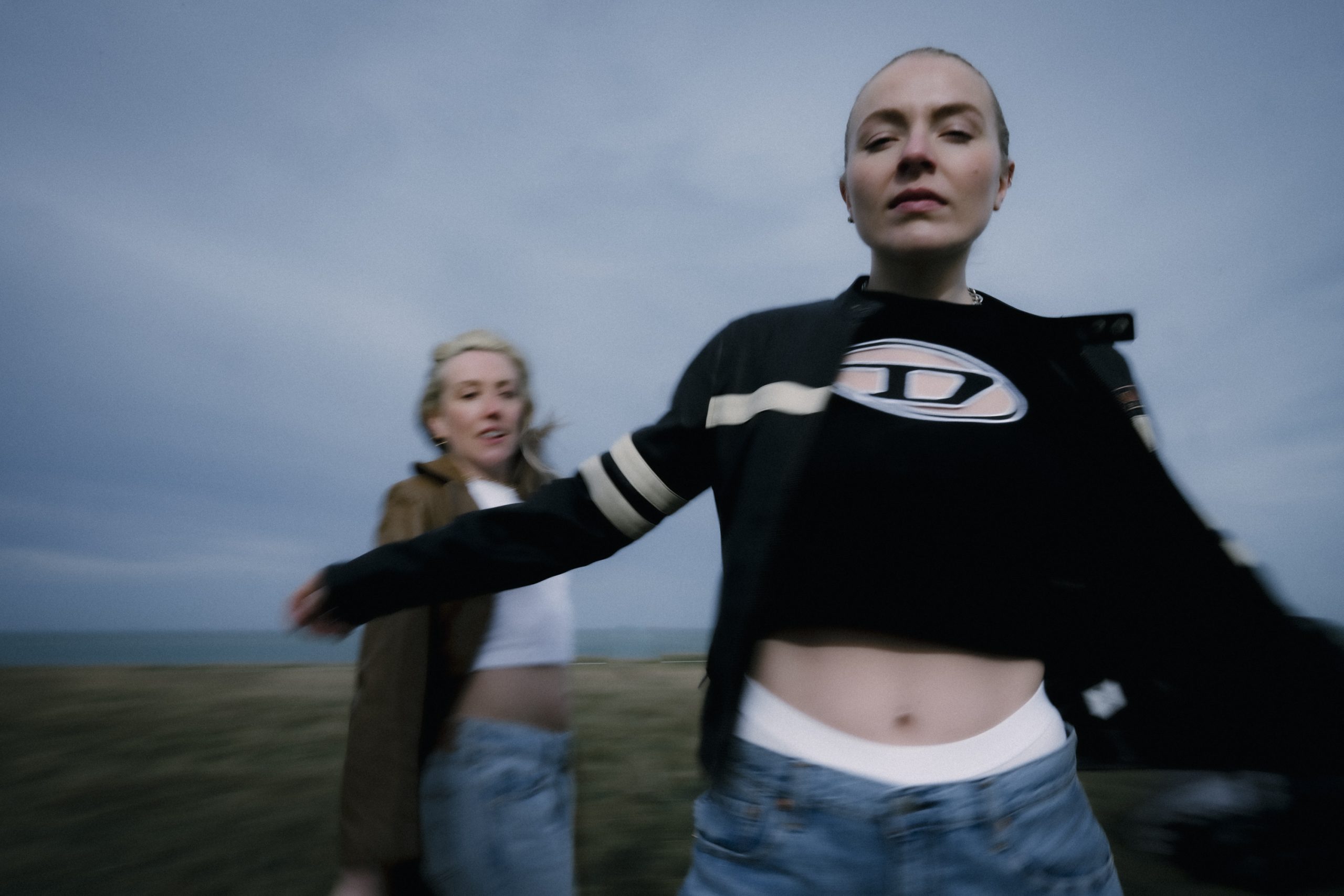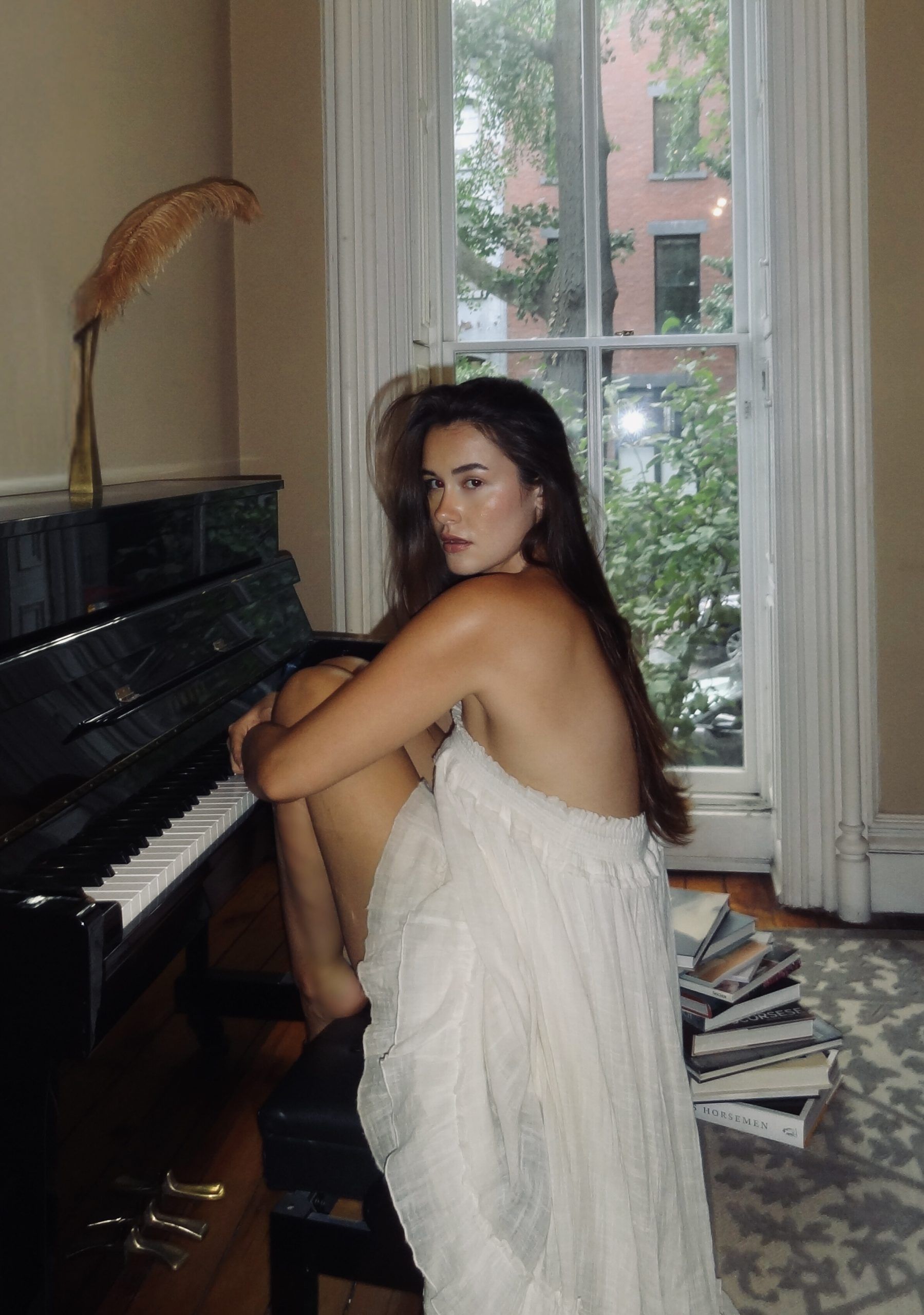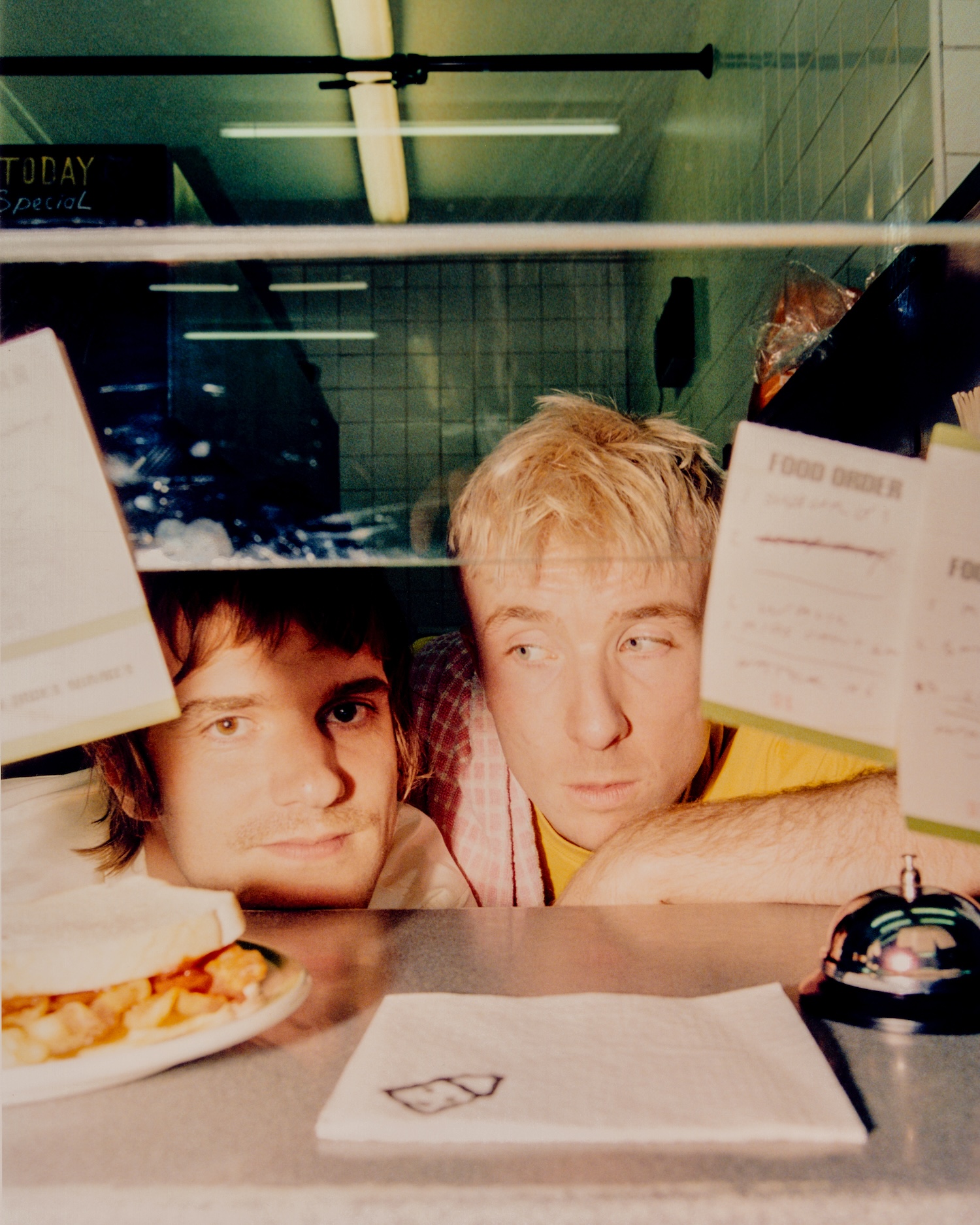With their new album Late To The World, long-time collaborators Megan Markwick and Lily Somerville of IDER deliver a bold, genre-blurring collection that dives deep into the messy, beautiful business of growing up, breaking down, and starting over. “We felt like late bloomers,” Megan shares. “We coined the phrase Late To The World on a walk and instantly knew—it wasn’t just a song title, it was an album title. It summed everything up.”
Written and recorded in a converted church-turned-studio with producer Dann Hume, Late To The World is rich with sonic contrasts—electro-pop highs, indie-rock edges, stripped-back piano ballads—woven together by the duo’s signature harmonies and razor-sharp lyrics. It’s a record that thrives on emotional complexity: female rage, healing, attachment styles, and self-acceptance all take center stage. “There’s this grandeur in the space we recorded in, and it brought something out in us,” Lily says. “It felt special. Sacred, even.”
Tracks like “Attachment Theory” and “Good Fight” exemplify the band’s deft balance between deeply personal storytelling and universal resonance. “We’re lyrics girls,” Megan laughs. “That’s always been our thread—what are we trying to say, and how do we say it in the most honest way possible?” And it’s this honesty that hits hardest. The songs are born from real conversations—between themselves, with friends, with the world—and evolve through a fluid, intuitive process that keeps their partnership dynamic and deeply collaborative. “Sometimes people guess who started a song,” Lily adds. “Which I love, because it shows how different our approaches can be.”
As they prepare to take these songs on their tour, Megan and Lily of IDER open up about their creative process for this album, the power of emotions, and the intentionality behind their genre-blurring sound.



Congratulations on your new album, Late To The World! Can you share what inspired the title and how it reflects the themes of the album?
Megan: We came up with the title on a walk, talking about how we felt like late bloomers. We coined the phrase Late To The World then and there, and immediately thought, ‘That would be a great song title for a song.’ When we eventually wrote the song, it felt obvious that it should be the album title too—it was a natural, organic decision, it didn’t feel forced. The album explores themes of feeling like a late bloomer, having to unlearn childhood conditioning, and navigating the world as women—experiences we feel many can relate to, especially as artists. It felt appropriate as an overarching title.
You mentioned that recording Late To The World was a different experience for you both, particularly the time spent writing in a church. How did that environment shape the music and your approach to songwriting?
Lily: This was the first time we lived in residence at a recording studio, allowing the songs to grow together and influence each other. It was like being in a safe and creative bubble, completely shut off from the outside world, with no external stresses or influences. It felt like we could fully explore the album, allowing each song to develop on its own while still being part of a larger journey. It was such a rewarding experience, we never had the opportunity to do that before but now we can see why people do it.
Our producer had just moved into this church when we met him. He was converting it into a studio, so when we started recording, it was still in its early stages and still in its development spaces. We were the first ones to make a record there. It was such a special environment, it was beautiful with the stained glass and the high ceilings—there’s this grandeur that makes you want to step up to it. It felt really special.
Megan: It’s magical and historical, that was definitely something we felt.


The album features a mix of electro-pop and indie rock. How did you balance these contrasting genres, and what role did producer Dann Hume play in bringing this vision to life?
Megan: I think we’ve always, as a band, crossed genres, and we really leaned into that from the very beginning. Our goal was to be intentional—mixing different sounds, live and electronic instruments, going big or small when it felt right, but never adding anything just for the sake of it. In pop music, there’s a tendency to keep throwing things at a song when in doubt. Whereas for us, we really, really wanted to just be like, “no, does it need that? Do we need to add that?” That was our only real rulebook—and yeah, it definitely came with its challenges.
Lily: It did! But we also let the songs lead—like “Girl” naturally leaned into an electronic space, while Know How It Hurts had more of an ’80s guitar-led feel. So we’re leaning into all of these. We also noticed songs on the album had “siblings”—like “Girl” and “Unlearn” feel connected, and “Killing the Game” speaks to “Zero”. So it was about mapping it out in a way that felt cohesive, where every track had a pal.
So it must have been lyrics first, would you say, when creating the album? Before you came up with the sound behind it.
Megan: We don’t work exclusively like that—it’s different for every song. But a lot of the time, we’ll write on piano with our vocals, super stripped back, and then take it into the studio to experiment with production. That said, it’s interesting you mention lyrics because we are lyrics girls. That’s one of the biggest threads throughout the album, and in our music generally—what are we saying, and how do we want to say it? That’s always the most important part for us.
“Attachment Theory“ explores love languages and attachment styles in a deeply personal way. How did you approach translating such complex psychological concepts into something that feels so personal and relatable?
Lily: I guess the more personal you get, the more universal it becomes. The deeper you dig into your own truth, the more people can connect with it—we really believe that. So it was about getting to the heart of what we wanted to say on the subject. And that chorus lyric feels more overarching, tying into how attachment theory has become such a zeitgeist in the past few years. People are obsessed with it—including me! Maybe that’s just an echo chamber, but it does feel like more and more people are having these conversations.
Your music strikes the perfect balance between deeply personal and tapping into the broader emotional experiences. How do you balance personal storytelling with creating something that resonates with a wider audience?
Lily: I’d say a bit of both, really. A lot of our songwriting comes from conversations—whether between us, with friends, or from personal experiences. There’s always input from the outside world, what feels socially relevant, but some songs come from deeply personal places. We encourage that out of each other and edit each other along the way.
Megan: Yeah, and I think it’s also the dynamic between us and it’s throughout all of our music. Since we write together and we have this duality—we’re always bouncing ideas, thoughts, lyrics, and feelings off each other. That back-and-forth is what makes the music both personal and reflective of a wider perspective.
You’ve said that Late To The World is the album you’ve “always wanted to make.” What was it about this project that gave you the freedom to explore these themes and sounds in the way you did?
Megan: Making a record in one place, with one producer, in this incredible church-turned-studio residency—it was an amazing experience. We’d always wanted to do something like that, but the opportunity didn’t come until we met Dan Hume, our producer.
I think a lot of people can relate to this, but after the pandemic, everything was questioned. It was a huge period of change for us—not just because of lockdown, but also shifting our team and being between record deals. We had to ask ourselves, What do we really want?
When we decided we absolutely wanted to make another album and really go for it, there was this new energy—like, Okay, how do we achieve this? It gave us the space to stop, reassess, and move forward with real intention.


Throughout Late To The World, and especially in “Good Fight“, you explore complex emotions—anger, vulnerability, joy, and rage. How do you think music can express the feeling of anger, which is often difficult for women to express, and how do you want listeners to connect with them?
Lily: Female anger is definitely a through-line on some of the songs, and it ties into feeling like a late bloomer—unlearning things, realizing how anger fuels change and growth. There’s such fear around women being angry, like it’s not socially acceptable.
“Good Fight” is a great example. It’s about female anger, but with a bit of tongue-in-cheek playfulness. The production is cheeky, but the message is serious. We wanted to show that anger isn’t just okay—it’s necessary. It sparks change, and we should embrace it. This is how you incite change and how you create a fire for that change.
The writing process for Late To The World seems to have been very collaborative between you both. How would you describe your creative partnership, and how do you support each other in pushing boundaries?
Megan: It’s different for every song. Sometimes we’ll sit down with a clear idea—like “Attachment Theory” started because we wanted to write about attachment styles. But then I went away and started writing from a personal experience, brought it back to you, Lil, and we opened it up again. So it was a mix of having a brief to take it away and allowing it to come out in a kind of natural, quite personal, like unconscious way.
Other times, we write separately and bring ideas to the table, or we sit down and write together. It’s a real mix, and I think you can hear that on the record. Friends and family even guess, like, “Oh, is that a Lil song?”—which just shows how differently they start.
With your upcoming world tour, what are you most excited about in terms of performing these new songs live? How do you anticipate the fans will react to these tracks in a live setting?
Lily: A couple of live moments feel really exciting—”Zero”, which hasn’t been released yet, and “Know How It Hurts.” That one has a bit of a rallying feeling, and with a crowd, it’s going to be really exciting.
Megan: Yeah, and we have a wicked band with us—drummer, bassist, guitarist—so it’s big. We’ve really leaned into the anthemic energy of the record, and a live show gives us license to take everything up a notch. There are intimate, stripped-back moments with just the two of us harmonizing, but also massive, elevated band moments. I think we’ll shock people in the best way—leaving them pumped up, empowered, and moved.
Lastly, what’s the overarching message or feeling you hope listeners will take away from Late To The World?
Lily: Connection and empowerment.
Megan: The confidence to be unapologetically yourself—embracing every side of who you are.



Interview Sabrina Hebert
Photography Garry Jones





